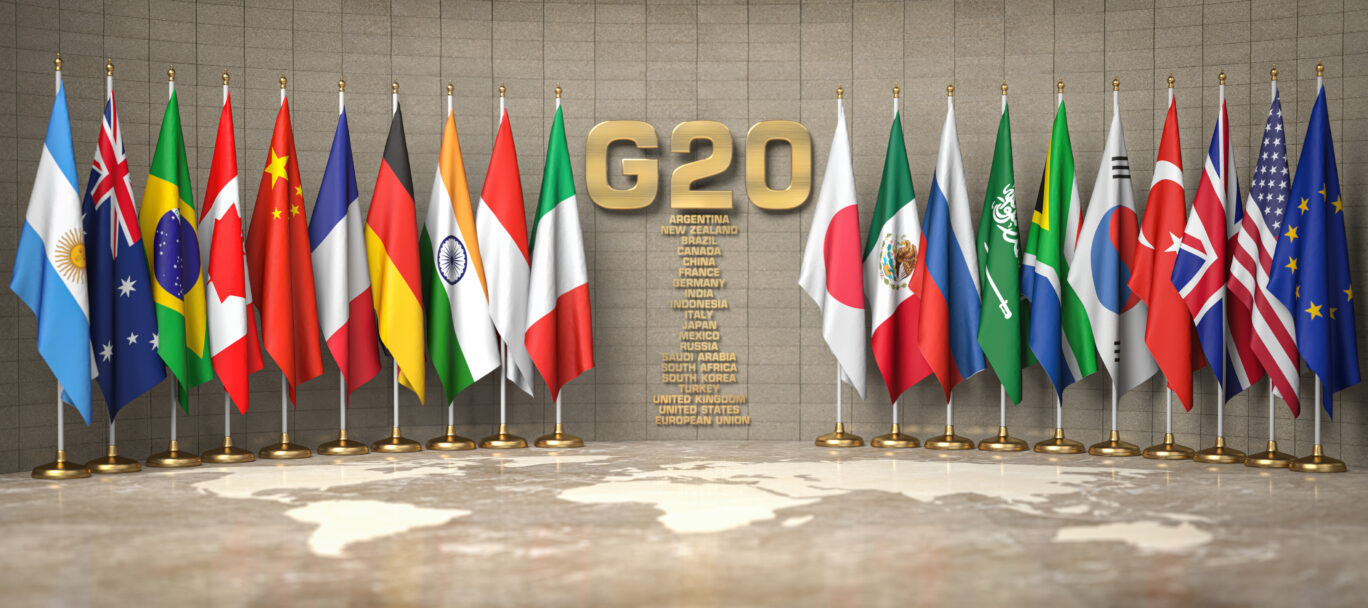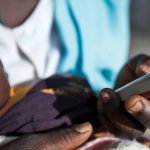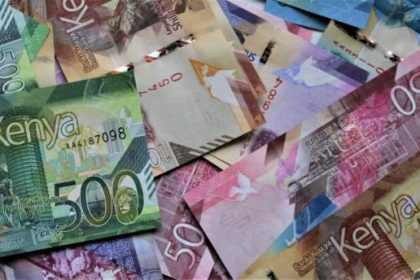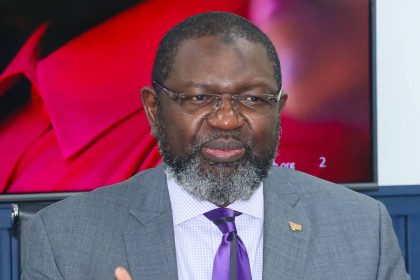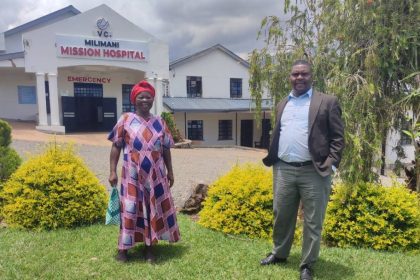Africa’s G20 agenda boils down to four key demands: climate finance, debt relief, digital access, trade and fair trade before the USA assumes the presidency in 2026, potentially shifting focus away from Africa.
As South Africa takes over the Presidency of the G20 this year, African leaders are pushing the continent to shift from a symbolic seat to transformative results for its 1.5 billion people. The African Union (AU) secured the permanent seat during India’s Presidency in 2023, a major milestone, which policy experts warn will go to waste without a clearly coordinated strategy.
The G20, or Group of 20, comprise 19 of the world’s biggest, most influential economies plus the European Union (EU). Think USA, China, Germany and India. Members meet annually to discuss economic challenges and global problems with solutions pegged on consensus. In a nutshell, discussions revolve around global financial stability, climate change and sustainable development, international trade, debt crisis for developing countries and health emergencies, like Covid-19.
Policy experts identified four priority areas for Africa’s G20 efforts: climate action and finance, debt reform, digital infrastructure, and trade and value addition.
“We cannot continue to attend different meetings and not push our own agenda,” said Dr Hamady Diop, Senior Advisor to the AU special envoy on food systems, during a high-level briefing on Africa’s G20 strategy on Thursday, August 28, 2025.
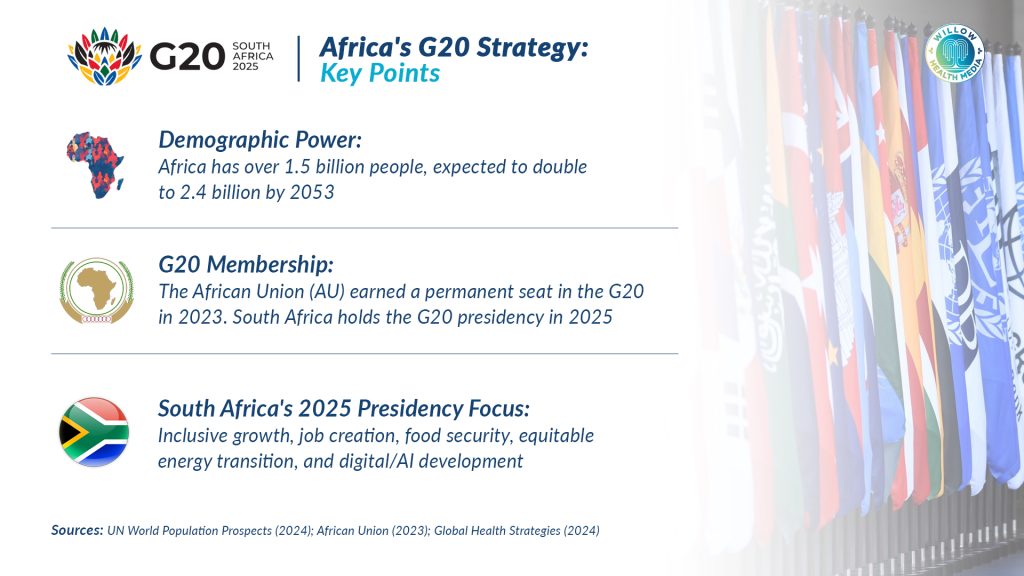
African negotiators are demanding $300 billion (Ksh39 trillion) by 2035 for climate action and “commitment to a fast-track revision of the new collective quantified goal by 2030 and agree on a new target of $1.3 trillion annually by 2030 with a minimum threshold for public grant-based financing,” according to Alvin Munyasia, Climate Fellow at the African Group of Negotiators.
One track cannot push for one agenda and the other push for a different agenda
The event saw the launch of “African Union in the G20” report, jointly produced by Global Health Strategies (GHS) and Africa Catalyst, along with a policy brief “Maximising Africa’s Influence in the G20,” offering a strategic blueprint for Africa’s transition from symbolic presence to active influence.
“When the ministers of finance and foreign affairs attend meetings, they need to speak the same language,” Diop stated. “One track cannot push for one agenda and the other push for a different agenda.”
Mma Amara Ekaruche, Senior Research Fellow at the Centre for the Study of Economies of Africa, stressed the importance of value chain addition for critical minerals like lithium and cobalt.
“Let’s have these minerals refined in the continent and ensure that local businesses participate such that knowledge and technology can be shared,” she said, emphasising the need to avoid repeating historical mistakes with Africa’s critical minerals.
With climate change disproportionately affecting African nations, experts stressed the need for accessible, grant-based climate financing. Munyasia called for “clear timelines and accountability mechanisms for developed countries to meet and exceed their pledges.”
Zambia’s successful debt restructuring through G20 mechanisms, though taking three and a half years, demonstrates the potential for progress in debt relief.
“The climate situation wasn’t caused by African countries in the first place,” Ekaruche noted, “so we shouldn’t take on so much of the burden.”
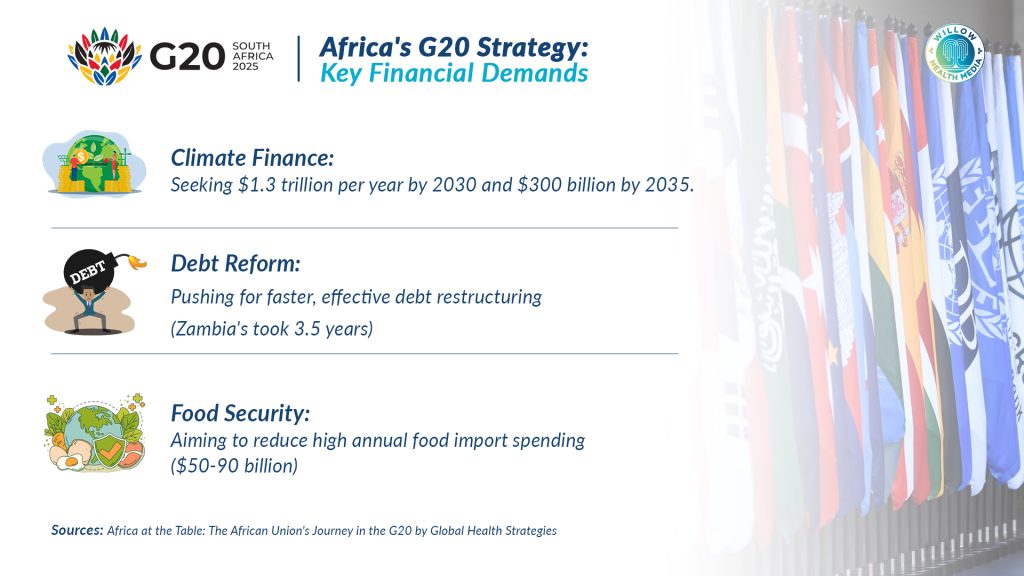
Justice for Africans and people of African descent through reparations
As the world advances toward Artificial Intelligence (AI) and the Internet of Things, Africa seeks to ensure its participation in setting global digital standards and protecting data privacy rights.
Ekaruche highlighted successful African initiatives that could be scaled globally, such as Kenya’s M-Pesa mobile payment system, which has become “the envy of even the Western world in terms of digitalisation.”
South Africa’s presidency aligns with the AU’s 2025 theme of “justice for Africans and people of African descent through reparations.” Key priorities include inclusive economic growth, job creation, industrialisation, food security, agricultural resilience, and debt sustainability for low-income economies.
Other priorities are equitable energy transition for climate action, critical mineral resource governance, digital transformation and AI development, and disaster resilience and response.
Africa currently spends $50-90 billion (Ksh6-12 trillion) annually importing food, despite having vast agricultural potential. With the continent’s population expected to double to 2.4 billion within 30 years, food security has become critical.
The G20 operates through two main tracks: the Sherpa track, which sets the agenda for heads of state; and the finance track, which discusses economic issues. These are supported by numerous engagement and working groups covering business, civil society, think tanks, and foundations.
Progress includes establishment of an African credit rating agency and African Central Bank
Experts recommended several institutional reforms, including the establishment of a permanent G20 secretariat within the AU to monitor day-to-day issues, develop evidence-based policies, and coordinate feedback from technical working groups.
They also called for enhanced coordination between different African representatives in G20 tracks, strengthening of technical expertise across African governments, and strategic partnerships within and beyond the G20.
Recent progress includes the establishment of an African credit rating agency set to begin operations, and the advancement of African financial institutions, including an African Central Bank and African Investment Bank.
During the 2008-2009 financial crisis, the G20 coordinated global stimulus measures that provided stability. During the Covid-19 pandemic, the Debt Service Suspension Initiative benefited about 40 low-income countries, many of them African.
The AU’s establishment of the Africa Centres for Disease Control and Prevention, along with coordinated continental responses to Covid-19, demonstrated the potential for unified African action on global platforms.
Experts emphasised the crucial role of media in reframing Africa’s global narrative. “Africa’s story must no longer be told by others,” Munyasya stated, calling for a shift away from victimhood framing toward highlighting resilience, innovation, and leadership.
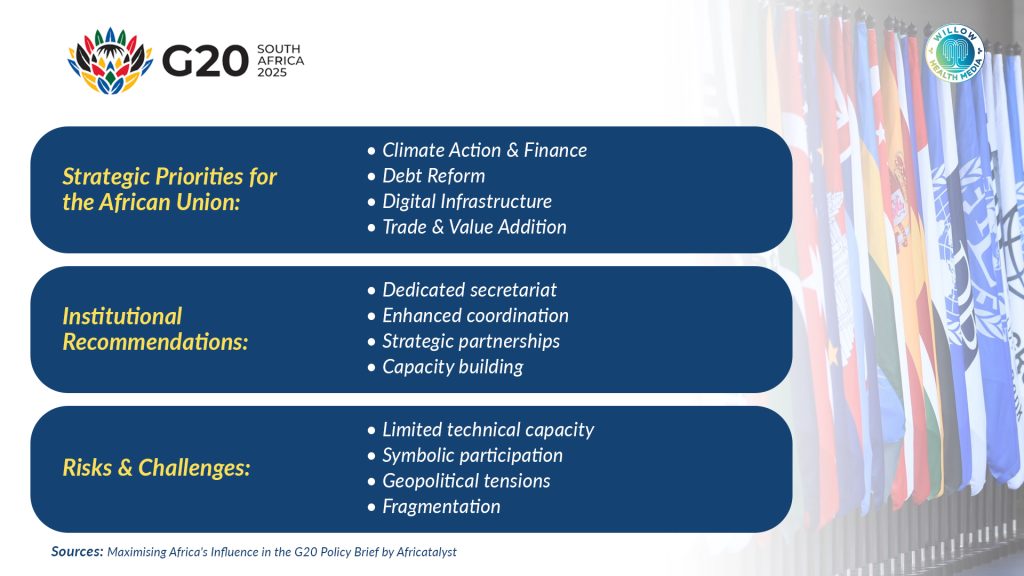
USA will assume the presidency in 2026, potentially shifting focus away from Africa
As the G20 presidency rotates annually, maintaining momentum on African priorities presents ongoing challenges. The United States will assume the presidency in 2026, potentially shifting focus away from African concerns.
The Africa Continental Free Trade Area (AfCFTA) presents additional opportunities for leveraging G20 participation. Experts see potential for positioning the trade agreement as a vehicle for climate-resilient industrialisation and clean energy trade.
Several risks could undermine Africa’s G20 effectiveness: symbolic participation without proper structures, coordination challenges between the AU and member states, insufficient expertise to develop sophisticated policy proposals, and current global tensions between major powers that could sideline African priorities.
“We have a new opportunity since the presidency of India to have a seat at the table,” Diop noted. “But having a seat at the table also comes with a lot of responsibilities.”
For the 54 AU member states, the G20 represents more than just a diplomatic achievement. It offers a platform to reshape global economic governance, advance climate justice, and secure the financial architecture needed for sustainable development across the continent.
The ultimate test will be whether these high-level negotiations translate into tangible improvements in the lives of ordinary Africans, from farmers in rural Kenya to entrepreneurs in Nigeria’s cities.



